Knightshade
Well-Known Member
Where does NHTSA call that out?
I can't find "1,000" anywhere on NHTSA.
From the report I pulled:

Data likely shows Teslas on Autopilot crash more than rivals
The government plans soon to release data on collisions involving vehicles with autonomous or partially automated driving system that will likely single out Teslas for a disproportionately high number of such crashes
Tesla’s figure and its crash rate per 1,000 vehicles was substantially higher than the corresponding numbers for other automakers that provided such data to The Associated Press
Not EVERYONE provided such data as you note though.
GM, Ford, Stellanis, and Nissan are among those called out as having so reported- and Toyota and Honda called out for not doing so.
I know HOW they measured it. My point was that any REASONABLE measurement should involve accidents per mile driven, and that makes Tesla's far safer than any other auto.
It's weird you insist a measure for which we literally have no data proves one system far safer than another.
Can you show your math?


